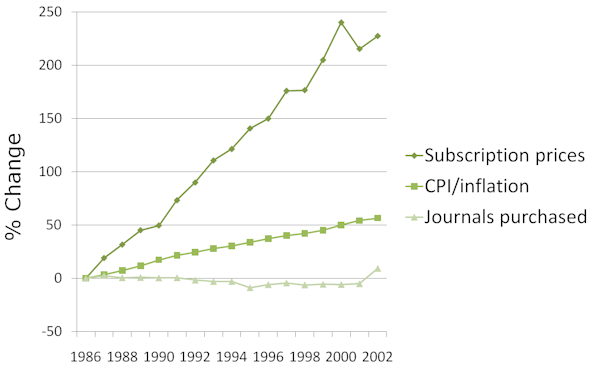Main Menu
Welcome
It seems like nothing of that money is making its way down to the university library. For instance, for the last few months, I have not been able to access the Elsevier journals Cell or Neuron. These are not obscure journals, on the contrary, they are among the most visible biomedical journals in the world. I had always been under the impression that libraries use Impact Factors to select which journals they should subscribe to. Cell has the 9th highest IF (31.253) out of all the 6568 journals indexed by Thomson Reuters. Neuron is number 62 with an Impact Factor of 14.170. That's still in the very first percentile. How bad does a library budget have to get when even these journals are not subscribed to any more? How 'excellent' is a university which doesn't recognize the basic needs of its scientists? Not that I'm really all that surprised, given the hyperinflation of journal subscription prices over the years:

Online access fees to Cell and Neuron could not be found as online access is bundled for each university and the prices negotiated in private. Print access was US$1473 per year each.
UPDATE: The solution to this problem, as rightfully pointed out in the FriendFeed discussion, cannot be to throw yet more tax-money at commercial publishers. The solution is to get rid of commercial publishers in scholarly communication. Universal open access to taxpayer funded, public research is the only viable solution to this pathetic charade. Of course, this doesn't preclude that the selection of subscriptions reflects the need of the scientists...
Posted on Friday 30 October 2009 - 10:28:33 comment: 0
{TAGS}
{TAGS}
You must be logged in to make comments on this site - please log in, or if you are not registered click here to signup
Render time: 0.0632 sec, 0.0045 of that for queries.





